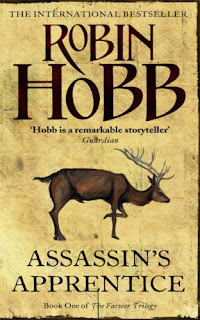We have long been reading Robin Hobb's tales from the Realm of the Elderlings. That is, I read, while Linda sews, knits, draws, or plays computer games (yeah, she didn't put THAT on her blog, did she?). We have finished three trilogies (Farseer, Liveship Traders, and Tawny Man), and are waiting for Hobb to finish the last book in her fourth trilogy before we embark on that.
One thing that makes Hobb's books so interesting compared to many other fantasy writers is that she has created a world where it is not given which people group or race is 'good' or 'bad'. This way she can write a trilogy from the perspective of one group, in which other peoples are portrayed as 'barbaric', while the next trilogy might be written from this very group's perspective, showing the 'barbarism' of the former group. In a world of more than five different people groups and a time-span of potentially thousands of years, she can keep writing for a while.
I am not going to recount the stories here. I only want to say that there are enough books in the world about the theological undercurrents in the works of C.S. Lewis and J.R.R. Tolkien. It is about time Robin Hobb had her following of the 'theologically interested'. Aside from more obvious 'religious' traits such as magic(s), prophesies, betrayal and reconciliation, and innocent sacrifices - common to so much fantasy literature-, her books are filled with themes such as global and ecological restoration after a cataclysmic Fall in the past, humans being destined for 'deification' (mutating into something 'higher' through the correct interaction with the world), mixed with a high regard (almost sacramental) for the ordinary life of eating, sleeping, and working.


No comments:
Post a Comment